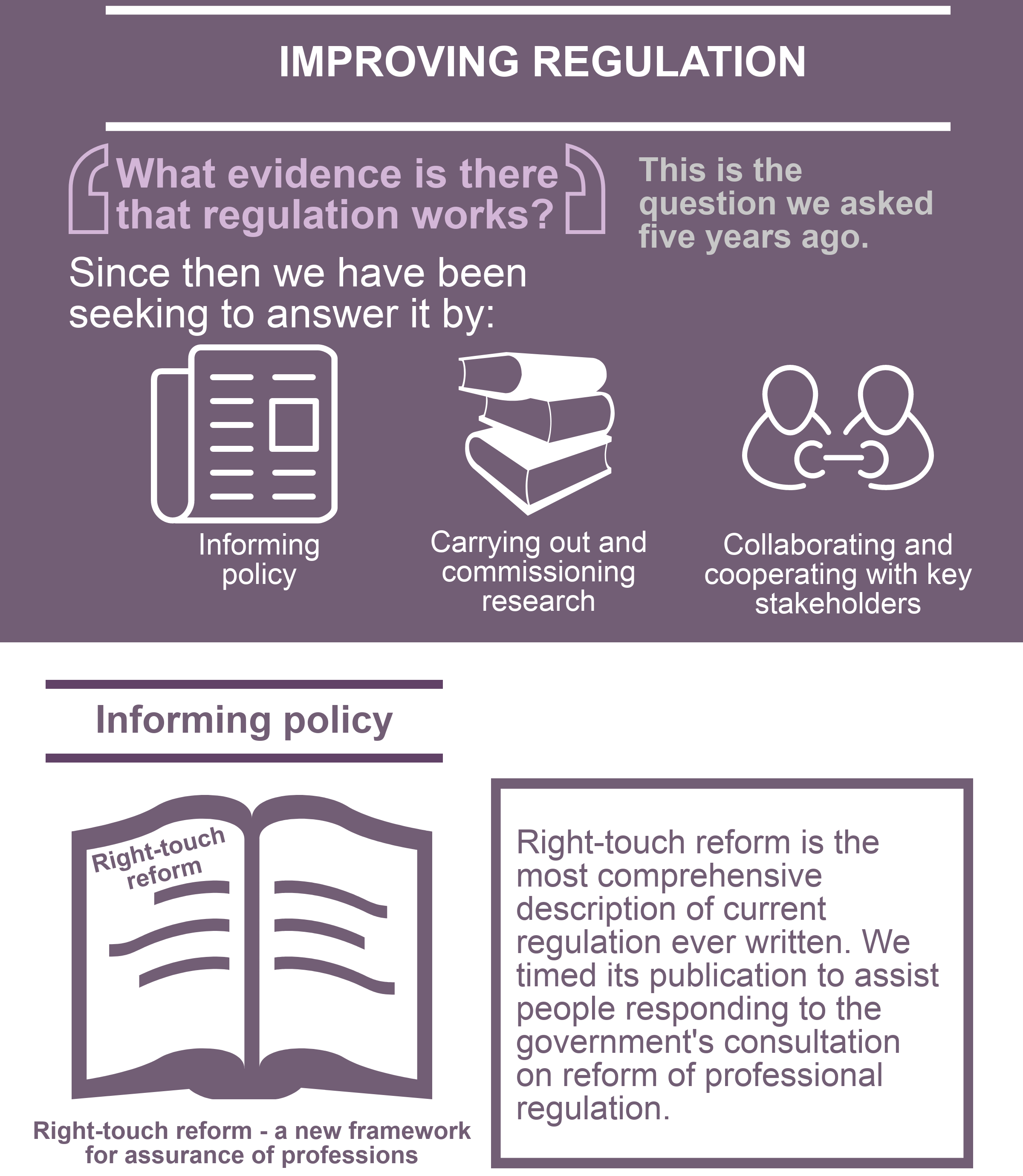Research and policy update
Reforming regulation
.png?sfvrsn=d1207320_19)
This story was updated on 24 January as the deadline has passed but you can see what we had to say in our response.
There is still time to respond to the government’s consultation Promoting professionalism, reforming regulation. With everything else that is happening in the world, reforming health regulation may not be that high up on the news agenda. However, as our Chief Executive Harry Cayton said: ‘Regulation is not about red tape – it is fundamentally about people, life and death.’
We believe that professional regulation in its current state is holding back innovation and is out-of-step with modern healthcare needs and workforce demands. We want people to get involved and respond and to help with this, we have published a special report – Right-touch reform (see below for more details).
The deadline for responding is Tuesday, 23 January 2018. You can find out more from Gov.uk, including how to respond and a pdf of the consultation.
Right-touch reform
Right-touch reform is the third in our series of publications about the need for reform and follows on from Rethinking regulation, and Regulation rethought.
It is a comprehensive report to help people understand how regulation works now and what needs to change to keep patients’ safe in the future. It covers four main areas: the role of regulators in preventing harm; the future of fitness to practise; professional regulators’ role in education and training; and modernising registers.
As well as making proposals for future development and improvement, the report provides detailed summary and analysis of current arrangements in these areas to help stakeholders understand them and to act as a platform for discussions about reform. The full report is available to read from our website, but we have also broken it down by chapter, so if you are interested in a particular subject you can read each chapter separately:
We have also produced a summary guide of our thinking on the future of fitness to practise which explains the current approach to dealing with complaints about health and care professionals, the problems with it and our proposals for both short and longer-term improvements.
Recent research published
Ground-breaking research reveals that trust in healthcare is undermined by ‘bad apples’
In November we published ground-breaking research funded by the Authority and proposed to us by Professor Rosalind Searle. The study involved analysing 6,714 cases of professional misconduct by health and care professionals from the Authority’s fitness to practise database.
Professor Searle and her team applied cluster analysis to identify how different kinds of misconduct group together for the different professions (looking particularly at fitness to practise cases involving registrants of the General Medical Council, the Nursing and Midwifery Council and the Health and Care Professions Council). They also looked in more detail at cases involving sexual boundary violations and dishonesty.
The research identified three different types of perpetrator of professional misconduct:
- the self-serving ‘bad apple’
- the individual who is corrupted by the falling standards of their workplace, and
- the depleted perpetrator struggling to cope with the pressures of life.
At the launch of the publication, Professor Searle (opposite) said: ‘In shining the spotlight on professional practice in the health sector, we’re examining relationships that are often intimate in nature and based on trust and confidence between health workers and service users. It’s crucial, therefore, for us to analyse where and how these taken-for-granted notions are being undermined through misconduct, and to take steps towards reducing instances of such behaviour. The findings in our report represent important progress in understanding and tackling the issue, and in ensuring trust and confidence in the health professions is preserved.’
professional practice in the health sector, we’re examining relationships that are often intimate in nature and based on trust and confidence between health workers and service users. It’s crucial, therefore, for us to analyse where and how these taken-for-granted notions are being undermined through misconduct, and to take steps towards reducing instances of such behaviour. The findings in our report represent important progress in understanding and tackling the issue, and in ensuring trust and confidence in the health professions is preserved.’
The findings from the study have much broader implications and go beyond the regulatory process. The next steps will be to discuss the findings more widely looking at how they can be used to support preventative interventions in future by regulators, employers, and others.
Find out more – you can read:
First report published which collates all nine regulators’ fitness to practise allegation categories in one place
Just before Christmas we published a new research paper. We wanted to understand the current state of fitness to practise categorisation by the regulators. The report provides a description of UK health and care professional regulators’ categorisation of fitness to practise allegations and it is the first time all the category lists for these types of allegations have been published in one place.
It also describes how the regulators use the categories, the variations in the number and types of category and the differences in the level of detail across the regulators.
It concludes by stating that these categories could have a wider use in the future – beyond the regulators’ fitness to practise processes. Useful and consistent fitness to practise data could play a part in preventative regulation. The report is available on our website and there is also an annex which lists out all the categories used by the nine health and care regulators.
Consultation responses
Since our last newsletter, we have responded to three more consultations:
Consultation responses are available on our website.
Research and Policy: key statistics for 2017
How did we contribute to informing policy last year? Find out more in our key stats for 2017 infographic.
